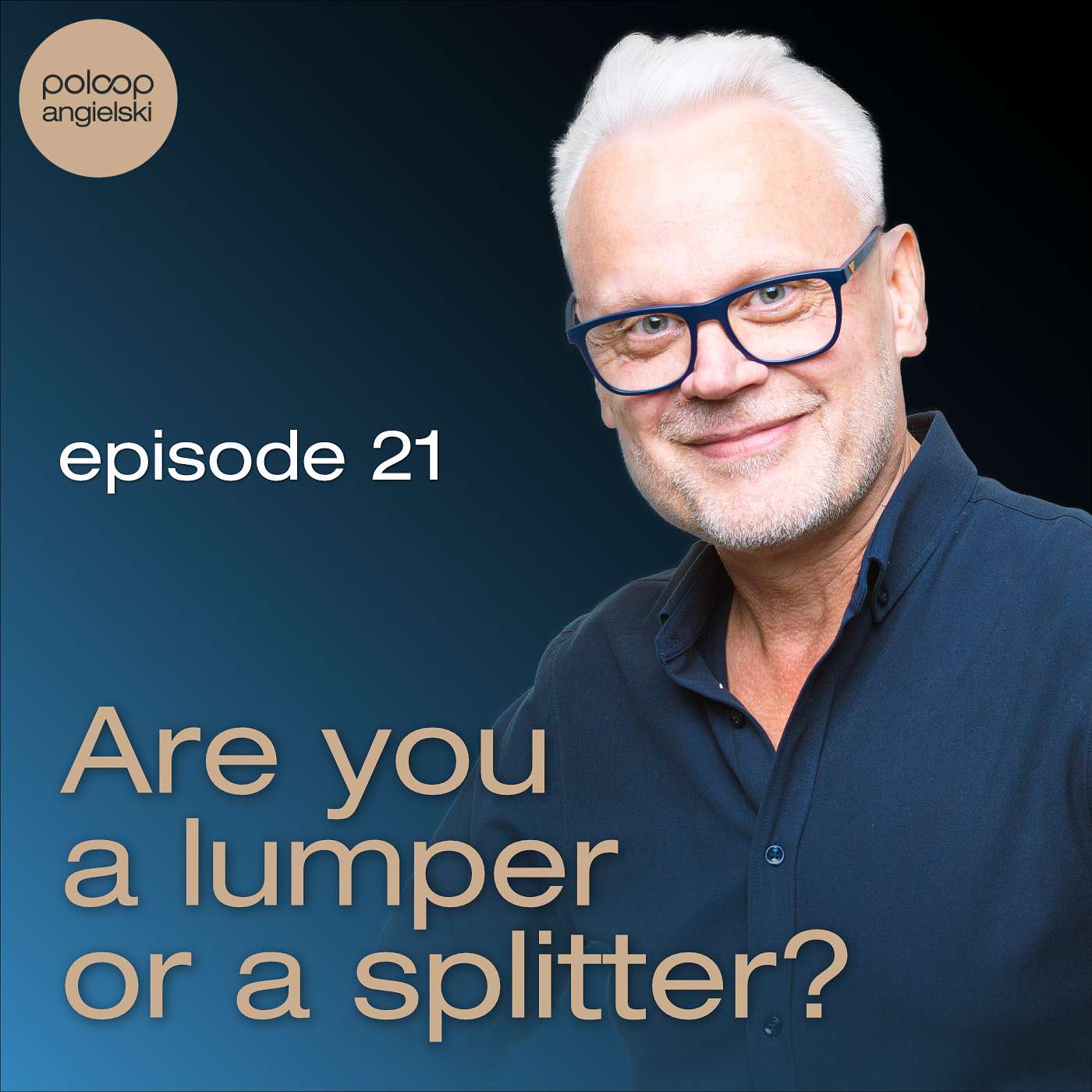
PoLoop Angielski
PoLoop Angielski
Episode 21. Are you a Lumper or a Splitter?
When it comes to learning a language, are you a lumper or a splitter? Which approach is better for learners of a foreign language?
You can download the complete transcript of this episode here.
Key terms used in the recording:
- to lump: to put things together in the same group and consider them as the same even though there are differences between them
- to split: to put similar things in different categories; to focus on differences between things rather than similarities
Other words and phrases used in the recording (in alphabetical order):
- armoury: skills or powers that are available for someone if they need to use it
- continual: continuing without stopping or happening again and again, often in an annoying way
- to convey a meaning: to communicate an idea
- to do justice to something: to represent something fairly, especially in a way that shows how good or attractive something is
- a fossilised error: an error that is fixed and difficult to get rid of
- a groundbreaking theory: a theory that changes the way we understand things; theory that leads to new discoveries
- to feel superior: to feel better than someone else
- hair-splitting: arguing about unimportant details or differences
- insight: a deeper understanding of what something is like
- inquisitively: showing interest; wanting to learn things
- the latter: the second of the two things that have just been mentioned
- to mansplain something: When a man mansplains something, he explains it to a woman in a way that shows he knows more about it than she does.
- matter-of-fact: said or done without showing emotion
- a merger of two words: a word created from combining two separate words
- minutiae: very small or unimportant details
- a nitpicking perfectionist: a person who focuses on small unimportant details trying to do things perfectly
- misinterpretation: a wrong way of understanding of a message
- nuanced: taking account of small but important differences
- to overthink something: to think about something too much
- to pay off: to bring some benefit; to be advantageous
- peckish: a little bit hungry
- to ponder something: to think carefully about something for a long time
- to reason with sb: to talk to someone trying to convince them or persuade them to do something
- to retaliate: to attack someone because they've attacked you first
- a shift: a change in something, for example in someone's ideas or methods
- to tell something apart: to see the difference between two things that are very similar
- trout: a fish that lives in rivers and lakes
- turquoise: bright green-blue in colour
- the upper hand: an advantage over someone or something
For more, visit: PoLoop Angielski Blog
Drop me a line: jacek@poloopangielski.pl
And join us on social media: Instagram and Facebook
Would you like me to help you master your English? You can find out more about my courses here.
Hello, I'm Jacek Olender and this is PoLoop Anglielski Podcast. For more materials for learners of English and a transcript of this episode, go to my website, poloopangielski.pl. Recently, I've spent some time thinking about the pros and cons of being either a lumper or a splitter when it comes to learning a foreign language, and I thought I might share with you some of my thoughts on the topic. If you wonder who a splitter is or who a lumper is, imagine a couple, Jack and Jill. It's late afternoon and they start feeling a bit peckish, you know, a little bit hungry. Neither of them feels like cooking, so they go out to have a meal in this restaurant that has just opened in the neighbourhood. 'What are you having?' Jill asks Jack looking over the menu. 'Don't know yet, but I think I know what you're going to order,' replies Jill.'Yeah, so what is it that I'm going to have tonight?' asks Jack, looking at Jill inquisitively. 'Smoked trout,' says Jill confidently. 'You love seafood, don't you?' she smiles, happy to be able to predict Jack's culinary preference for the night. 'Well, trout is not exactly seafood,' says Jack.'What do you mean trout is not seafood. It's a bloody fish, so it is seafood.' 'Not all fish is seafood,' Jack tries to reason.'Seafood comes from the sea. But trout doesn't. It is a freshwater fish, so technically, it is not seafood.' Now you can see where it's going. Now you can see, also in Jill's eyes, that she takes Jack's matter-of-fact explanation as an act of aggression. And to retaliate, she uses the best known weapon in the armoury of a modern woman. She says: 'Why do you always have to mansplain things to me.' For those of you who are not familiar with the weapons women currently use in discussions with men. The term'mansplain' comes from the merger of two words, 'a man' and'explain', and it means 'to explain something to a woman in a way that assumes that she has no knowledge about the topic', that the man feels superior about his knowledge. So the weapon is very efficient, and the man usually shuts up. What makes the weapon even more useful to ladies is that it can be only used by them as the crime of mansplaining could be never committed by a woman. So, Jill likes generalisations;, she groups everything into very broad categories. She's a lumper, who assigns examples broadly, assuming that differences are not as important as similarities. Jack, on the other hand, is a splitter, he needs precise definitions, and often classifies things as belonging to different categories. The origins of the terms could be traced to Charles Darwin, the guy who spent his life lumping and splitting various species in order to arrive at some sort of classification of various life forms, which obviously led to his groundbreaking theory of evolution. Since then, the terms have been used not only in biology, but in all kinds of fields, such as history, philosophy, psychiatry, even software development, anywhere where we could either group concepts together and see them as having more similarities than differences, lumping, or separate them and seeing them as different from one another - splitting. So what does it have to do with learning a foreign language? You see, when we acquire new words, expressions or grammatical structures, we consciously or subconsciously categorise them as well. We can focus on similarities of words and put them in general categories, so lump them, or we could pay more attention to differences between them and try to see how we can tell them apart. Let's take a look at how it works using an example. Let's say we want to learn two words, 'convince' and'persuade'. A lumper would say that both of them are the same. They both mean 'to cause someone to do something'. A splitter, on the other hand, would argue that there is a significant difference between them.'Convince' is more about changing someone's beliefs or opinions using reasoning, and'persuade' about making someone do something by asking, arguing or encouraging them. Let me give you another example. This time, let's consider grammar. A lumper would not really care that much about the difference between these two sentences. 'I bought a new phone,' and 'I have bought a new phone'. A splitter on the other hand, would argue that the latter sentence the second of the two examples, is more relevant for the current situation. It focuses our attention on the current, present result of this event. So the question is, which approach is better in the process of learning a foreign language? Do lumpers have advantage over splitters? Or maybe it pays off to be a splitter? I don't have the answer to this question. I can only share with you insights from my own experience as a teacher and a learner of a foreign language. I think, at the beginning of the process, it pays off to be a lumper. Knowing very little, we must make good use of what we already know, which means using general, broad concepts, we have no other choice except avoiding communication altogether. If you wanted to say that the water in the sea you swam in was turquoise, but you were a beginner in English, you would have to compromise your need to be precise, and you would have to describe the water as 'nice blue' or maybe 'green blue'. And it's great that you would do so. Because if you were a splitter, you would probably not say anything, feeling that describing the turquoise sea as'nice blue', or 'green blue' might not do justice to what you saw on the Caribbean beaches. So lumping seems to be the only way to go when you are the beginner. But as your English improves, and you feel more confident, you can focus more on being precise, and then splitters get the upper hand, get an advantage over lumpers as they are more likely to see nuanced differences between words and structures. Writing skills require a bit more splitting. When we put something in writing, we feel a need for more precision. We want to be understood correctly. And since in writing, we can't use gestures, intonation, or facial expressions to convey meanings. The more precise we are, the less room there is for misinterpretation. Students who are lumpers probably find it difficult to get rid of fossilised errors, the mistakes that we've been making for a long time, and they become a sort of habit. On the other hand splitters are often nitpicking perfectionists, who overthink the use of each structure each word, which is frustrating, to say the least. My teaching practice tells me that as you're making progress in learning a foreign language, you should make a gradual shift from being a lumper and adopt more of a splitter's mindset. Paying attention to how structures and words are used in different contexts, asking yourself how different synonyms are used to convey nuanced differences of meanings could make it easier for you to use a wider range of words. Asking yourself what lies behind the use of one grammar structure instead of another gives you the necessary insight that allows you to be more conscious of what you're saying. Having said that, some balance is always needed. And continual hair-splitting. pondering over the minutiae of English grammar or word usage might be something we should try to avoid This brings me to the end of this episode I hope you enjoyed it and will join me for more next week.Thank you, bye.




